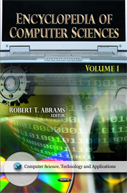 Sandra and I wrote a summary of different tools and forms of cooperative learning with Social Software in higher education. It was just published in the book „Encyclopedia of Computer Science“ (ed. Robert T. Abrams).
Sandra and I wrote a summary of different tools and forms of cooperative learning with Social Software in higher education. It was just published in the book „Encyclopedia of Computer Science“ (ed. Robert T. Abrams).
Our abstract:
Since the new generation of Internet technology, called Web 2.0, has been introduced, a change of how users are dealing with the World Wide Web has been get into going. If access to the Web is available, today nearly anyone can actively participate and communicate online. Of course this recent evolution of the Web influences also the field of education. Former e-learning was mainly characterized by the use of content offered within learning management systems. Nowadays so called “Social Software” enables new possibilities and didactical approaches. In this chapter we give a short overview of how Social Software can support cooperative learning and how new technologies can enhance higher education in a meaningful new way. After a short introduction to the basics of cooperative learning different Social Software applications are classified and described. Practical examples are presented to show the general usage. In the end we conclude that these technologies have great impact on teaching and learning, as it will help to enhance education at universities.
Within the paper, we distinguished different forms of Social Software:
Social Software can be distinguished concerning their main purposes
- Social presence and communication including discussion forums, Web chats, (micro-) blogging, (micro-) podcasting, and live streaming;
- Collaborative development including tools that allow a collaborative work and development as the Wiki technology; or
- Collaborative enrichment of content such as social bookmarking, social tagging, and rating.
Then we went on with a short description of different teaching settings (formally organised learning), where cooperative learning can be used:
1. Distance learning setting
The learners are distributed and do not meet in reality before and while learning and working together. The online communication is not always, but often asynchronous;
2. Blended learning setting
The learners meet in reality and additionally online but normally not parallel. The online communication usually is asynchronous;
3. Classroom group work setting – with 10 to 25 learners
Every learner additionally and parallel to “real” communication participates through networked computers or mobile phones on the group interaction
4. Lecture hall learning setting
The learners use networked computers or mobile phones to facilitate interaction and feedback loops in big groups of more than 40 people parallel to a (interactive) lecture.
In the paper we list tools and their usage and how it already worked (or not) within cooperative learning settings. We came to the conclusion (amongst other aspects!!):
The use of technology in education strongly depends on the questions how we can improve the quality of education and how we can benefit from it. For example, digital collaboration with the help of Wiki systems leads to new possibilities that had not been imaginable within a paper-based learning scenario. Furthermore tagging enhances learner’s content in a new meaningful way and makes the content shareable und reusable. Micro-blogging as described in previous chapters must be seen as a complete new form of communication – talking to a cloud, without knowing if anyone will read or even react to it.
As cooperative learning is very often a part of open educational practices, where learners have the possibilities to organize their own learning within their groups as active partners, changes of learning and teaching behavior is not only a matter of such new tools. Also the existing learning culture within the institution or the teaching abilities and attitudes of lectures are (amongst others) crucial aspects of teaching in higher education that has to be taken into account for a successful implementation or usage of such new tools for cooperative learning (cf. Schaffert, 2009).
Additionally, we have to bear in mind that such tools are not built especially for learning settings. It is up to the researchers and every single user to find out whether learners can benefit from it or not. (…)
Reference: Schaffert, S., Ebner, M. (2012) New Forms of and Tools for Cooperative Learning with Social Software in Higher Educatio, In: Encyclopedia of Computer Science, R. T. Abrams (Ed.), Nova Publishers, Hauppauge NY, p. 537-552

